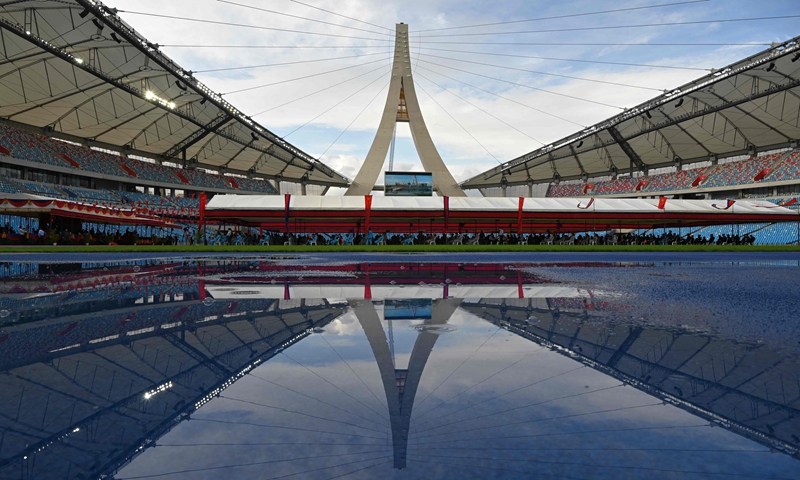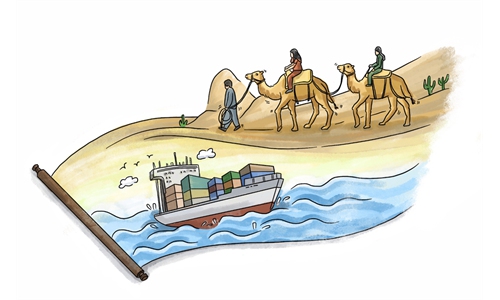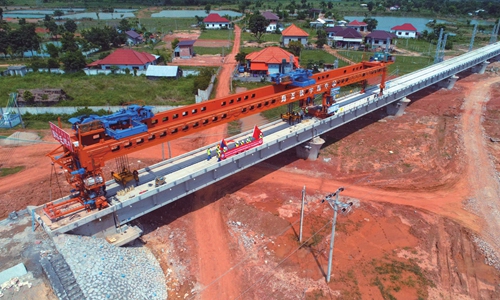Global Gateway scheme underscores the effectiveness of China-propsed infrastructure program: analyst

A view of the Morodok Techo National Stadium, funded through China-proposed Belt and Road Initiative, during the stadium's handover ceremony in Phnom Penh, Cambodia, on Sunday Photo: VCG
The Global Gateway scheme, which some observers believe aims to compete with the China-proposed Belt and Road Initiative (BRI), is likely inspired by the success of the BRI and will serve to fully demonstrate the effectiveness of Chinese-initiated global infrastructure program, Chinese analysts said on Thursday.
The EU will launch the Global Gateway scheme to compete with the China-proposed BRI, Politico.eu reported.
"We want to create links and not dependencies!" European Commission president Ursula von der Leyen said during the annual State of the Union address Wednesday, adding that "we are good at financing roads. But it does not make sense for Europe to build a perfect road between a Chinese-owned copper mine and a Chinese-owned harbor. We have to get smarter when it comes to these kinds of investments," according to Politico.eu.
The Financial Times in covering topic cited a senior EU official as saying that Brussels would offer developing countries "transparent and values-based" project financing.
Some Chinese analysts said the scheme is being rolled out as a political tool to challenge the BRI. However, the BRI advantages remain unshakeable. Wang Yiwei, director of the institute of international affairs at Renmin University in Beijing, said the move showed some politicians in the bloc are bent on pursuing their own version of global connectivity program and reducing reliance on Chinese investment.
By coming up with a scheme which seems to compete with the BRI, while emphasizing themes such as value and safety, some in the EU are probably paving way for an EU economy less reliant on China, some analysts said.
EU is not alone in churning out a global infrastructure plan with the aim to rival the BRI.
In June, the G7 summit in the UK saw the announcement of the "Build Back Better World" (B3W) initiative. The B3W initiative's stated goal is to deploy $40 trillion in infrastructure spend across developing nations by 2035.
European advantage
Analysts state it would be difficult to assess the real impact of the Global Gateway scheme as its feasibility still remains up for debate.
Projects that eventually come out of such initiatives are unlikely to be able to match BRI projects in scale, size and perhaps even in significance, Chinese analysts predicted.
But theoretically, the EU does enjoy certain advantage in a number of sectors and areas where it enjoys a comparative advantage.
Wang said because the EU is unlikely to garner enough political will nor the finances to implement mega infrastructure projects on par with the scale of BRI projects, the Global Gateway scheme might have some success in landing projects at key points in the global supply chain and major trade routes.
"More likely, we will see some digitalization projects, some green projects at some parts of the world, if the scheme was eventually transformed into concrete action," Wang said.
Egypt recently awarded a $4.45 billion deal for construction of a high-speed electric rail line to link the Red Sea and Mediterranean coasts, Reuters reported on September 1.
An analysis run by German media outlet Spiegel concluded that the deal "showed that the West can still compete against China."
However, Wang said the European approach may not work so well in Africa despite the optimism held by many EU politicians. He warned that the so-called European standards may remain far from reach in Africa, once against showcasing the success of the BRI projects, which are more pragmatic and deliverable.
The BRI's competitiveness remains unshakeable, Wang said, noting the initiative's strengths in industrial capacity, financing power combined with a practical approach.
Impact on the BRI
The EU and China has seen strained bilateral relations. The tough approach toward China by the EU in freezing the procedure to ratify the China-EU Comprehensive Agreement on Investment, which was reached last year after years of negotiations with the aim to boost bilateral cooperation, was one of some recent examples of unprovoked action taken by Brussels.
Cui Hongjian, director of the Department of European Studies at the China Institute of International Studies, told the Global Times on Thursday that the intention of the Global Gateway clearly shows that the EU in embracing a connectivity plan of its own, through which it can dictate terms and set rules.
And that could translate into rising risks for Chinese companies operating BRI projects in Europe, with potential impacts even reaching projects in non-EU countries.
The new EU plan is based on assumptions that the EU can supplant China's connectivity program with higher standards and European alternatives. "And this could mean some Chinese BRI project in EU could face intensified scrutiny, subject to more reviews, particularly when an anti-China party holds office in a partner country," Cui said.




